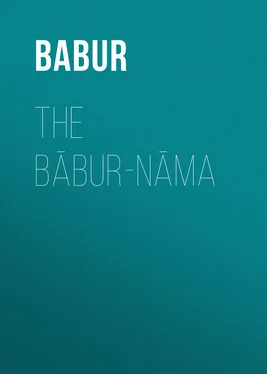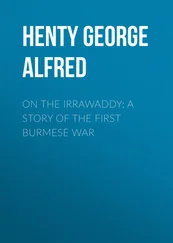Babur - The Bābur-nāma
Здесь есть возможность читать онлайн «Babur - The Bābur-nāma» — ознакомительный отрывок электронной книги совершенно бесплатно, а после прочтения отрывка купить полную версию. В некоторых случаях можно слушать аудио, скачать через торрент в формате fb2 и присутствует краткое содержание. Жанр: foreign_antique, foreign_prose, на английском языке. Описание произведения, (предисловие) а так же отзывы посетителей доступны на портале библиотеки ЛибКат.
- Название:The Bābur-nāma
- Автор:
- Жанр:
- Год:неизвестен
- ISBN:нет данных
- Рейтинг книги:4 / 5. Голосов: 1
-
Избранное:Добавить в избранное
- Отзывы:
-
Ваша оценка:
- 80
- 1
- 2
- 3
- 4
- 5
The Bābur-nāma: краткое содержание, описание и аннотация
Предлагаем к чтению аннотацию, описание, краткое содержание или предисловие (зависит от того, что написал сам автор книги «The Bābur-nāma»). Если вы не нашли необходимую информацию о книге — напишите в комментариях, мы постараемся отыскать её.
The Bābur-nāma — читать онлайн ознакомительный отрывок
Ниже представлен текст книги, разбитый по страницам. Система сохранения места последней прочитанной страницы, позволяет с удобством читать онлайн бесплатно книгу «The Bābur-nāma», без необходимости каждый раз заново искать на чём Вы остановились. Поставьте закладку, и сможете в любой момент перейти на страницу, на которой закончили чтение.
Интервал:
Закладка:
The Bābur-nāma in English Memoirs of Bābur
PREFACE
O Spring of work! O Source of power to Be!
Each line, each thought I dedicate to Thee;
Each time I fail, the failure is my own,
But each success, a jewel in Thy Throne.
Introductory
This book is a translation of Babur Padshah’s Autobiography, made from the original Turki text. It was undertaken after a purely-Turki manuscript had become accessible in England, the Haidarabad Codex (1915) which, being in Babur’s ipsissima verba , left to him the control of his translator’s diction – a control that had been impracticable from the time when, under Akbar (1589), his book was translated into Persian. What has come down to us of pure text is, in its shrunken amount, what was translated in 1589. It is difficult, here and there, to interpret owing to its numerous and in some places extensive lacunæ , and presents more problems than one the solution of which has real importance because they have favoured suggestions of malfeasance by Babur.
My translation has been produced under considerable drawback, having been issued in four fasciculi , at long intervals, respectively in June 1912, May 1914, October 1917, and September 1921. I have put with it of supplementary matter what may be of service to those readers whom Babur’s personality attracts and to those who study Turki as a linguistic entertainment, but owing to delays in production am unable to include the desiderata of maps.
Chapter I.
BABUR’S EXEMPLARS IN THE ARTS OF PEACE
Babur’s civilian aptitudes, whether of the author and penman, the maker of gardens, the artist, craftsman or sportsman, were nourished in a fertile soil of family tradition and example. Little about his teaching and training is now with his mutilated book, little indeed of any kind about his præ-accession years, not the date of his birth even, having escaped destruction. 1 1 Cf. Cap. II, PROBLEMS OF THE MUTILATED BABUR-NAMA and Tarīkh-i-rashīdi , trs. p. 174.
Happily Haidar Mirza ( q. v. ) possessed a more complete Codex than has come down to us through the Timurid libraries, and from it he translated many episodes of Baburiana that help to bridge gaps and are of special service here where the personalities of Bābur’s early environment are being named.
Babur’s home-milieu favoured excellence in the quiet Arts and set before its children high standard and example of proficiency. Moreover, by schooling him in obedience to the Law, it planted in him some of Art’s essentials, self-restraint and close attention. Amongst primal influences on him, his mother Qut-luq-nigar’s ranked high; she, well-born and a scholar’s daughter, would certainly be educated in Turki and Persian and in the home-accomplishments her governess possessed (ātūn q.v.). From her and her mother Aisan-daulat, the child would learn respect for the attainments of his wise old grandfather Yunas Khan. Aisan-daulat herself brought to her grandson much that goes to the making of a man; nomad-born and sternly-bred, she was brave to obey her opinion of right, and was practically the boy’s ruling counsellor through his early struggle to hold Farghana. With these two in fine influence must be counted Khan-zada, his five-years elder sister who from his birth to his death proved her devotion to him. Her life-story tempts, but is too long to tell; her girlish promise is seen fulfilled in Gul-badan’s pages. ‘Umar Shaikh’s own mother Shah Sultan Begim brought in a type of merit widely differing from that of Aisan-daulat Begim; as a town-lady of high Tarkhan birth, used to the amenities of life in a wealthy house of Samarkand, she was, doubtless, an accomplished and cultured woman.
‘Umar Shaikh’s environment was dominated for many years by two great men, the scholar and lover of town-life Yunas Khan and the saintly Ahrari ( i. e. Khwaja ‘Ubaidu’l-lah) who were frequently with him in company, came at Babur’s birth and assisted at his naming. Ahrari died in 895-1491 when the child was about seven years old but his influence was life-long; in 935-1529 he was invoked as a spiritual helper by the fever-stricken Babur and his mediation believed efficacious for recovery (pp. 619 Конец ознакомительного фрагмента. Текст предоставлен ООО «ЛитРес». Прочитайте эту книгу целиком, купив полную легальную версию на ЛитРес. Безопасно оплатить книгу можно банковской картой Visa, MasterCard, Maestro, со счета мобильного телефона, с платежного терминала, в салоне МТС или Связной, через PayPal, WebMoney, Яндекс.Деньги, QIWI Кошелек, бонусными картами или другим удобным Вам способом.
, 648). For the babe or boy to be where the three friends held social session in high converse, would be thought to draw blessing on him; his hushed silence in the presence would sow the seed of reverence for wisdom and virtue, such, for example, as he felt for Jami ( q. v. ). It is worth while to tell some part at least of Yunas’ attainments in the gentler Arts, because the biography from which they are quoted may well have been written on the information of his wife Aisan-daulat, and it indicates the breadth of his exemplary influence. Yunas was many things – penman, painter, singer, instrumentalist, and a past master in the crafts. He was an expert in good companionship, having even temper and perfect manners, quick perception and conversational charm. His intellectual distinction was attributed to his twelve years of wardship under the learned and highly honoured Yazdi (Sharafu’d-din ’Ali), the author of the Zafar-nama [Timur’s Book of Victory]. That book was in hand during four years of Yunas’ education; he will thus have known it and its main basis Timur’s Turki Malfūzāt (annals). What he learned of either book he would carry with him into ‘Umar Shaikh’s environment, thus magnifying the family stock of Timuriya influence. He lived to be some 74 years old, a length of days which fairly bridged the gap between Timur’s death [807-1404] and Babur’s birth (888-1483). It is said that no previous Khan of his (Chaghatai) line had survived his 40th year; his exceptional age earned him great respect and would deepen his influence on his restless young son-in-law ‘Umar Shaikh. It appears to have been in ‘Umar’s 20th year ( cir. ) that Yunas Khan began the friendly association with him that lasted till Yunas’ death (892-1483), a friendship which, as disparate ages would dictate, was rather that of father and son than of equal companionship. One matter mentioned in the Khan’s biography would come to Babur’s remembrance in the future days when he, like Yunas, broke the Law against intoxicants and, like him, repented and returned.
That two men of the calibre and high repute of Ahrari and Yunas maintained friendly guidance so long over ‘Umar cannot but be held an accreditment and give fragrance of goodness to his name. Apart from the high justice and generosity his son ascribes to him, he could set other example, for he was a reader of great books, the Qoran and the Masnawi being amongst his favourites. This choice, it may be, led Abu’l-faẓl to say he had the darwesh-mind. Babur was old enough before ‘Umar’s death to profit by the sight of his father enjoying the perusal of such books. As with other parents and other children, there would follow the happy stilling to a quiet mood, the piquing of curiosity as to what was in the book, the sight of refuge taken as in a haven from self and care, and perhaps, Babur being intelligent and of inquiring mind and ‘Umar a skilled reciter, the boy would marvel at the perennial miracle that a lifeless page can become eloquent – gentle hints all, pointers of the way to literary creation.
Читать дальшеИнтервал:
Закладка:
Похожие книги на «The Bābur-nāma»
Представляем Вашему вниманию похожие книги на «The Bābur-nāma» списком для выбора. Мы отобрали схожую по названию и смыслу литературу в надежде предоставить читателям больше вариантов отыскать новые, интересные, ещё непрочитанные произведения.
Обсуждение, отзывы о книге «The Bābur-nāma» и просто собственные мнения читателей. Оставьте ваши комментарии, напишите, что Вы думаете о произведении, его смысле или главных героях. Укажите что конкретно понравилось, а что нет, и почему Вы так считаете.











